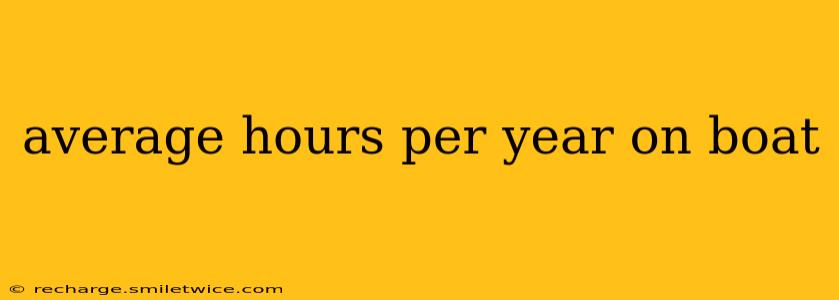Average Hours Per Year on a Boat: A Deep Dive into Boating Time
For many, the dream of owning a boat revolves around spending countless hours on the water, enjoying the sun, the sea, and the thrill of boating adventures. But how many hours do boat owners realistically spend on their vessels each year? The answer isn't straightforward and depends on several factors. This comprehensive guide will delve into the average hours per year on a boat, exploring the influencing variables and offering insights for potential boat buyers.
What is the average number of hours per year a boat is used?
There's no single definitive answer to this question. The average hours of boat use per year varies wildly depending on factors like boat type, location, personal lifestyle, and the time of year the boat is usable. Some owners might log only a few dozen hours annually, while others easily exceed 200. A more accurate way to think about this is to consider ranges. For smaller, recreational boats, a reasonable range might be 50-150 hours per year. Larger, more luxurious boats, or those used for extended trips, could easily surpass 200 hours.
How many days a year do people use their boats?
Similar to the hours question, the number of days a year a boat is used depends greatly on individual circumstances. Those living in areas with favorable weather year-round will naturally use their boats more frequently. Conversely, owners in regions with harsh winters or short boating seasons will likely have far fewer days on the water. A reasonable range could be anywhere from 10-50 days per year, though again, this depends significantly on the factors mentioned above.
What factors influence the number of hours spent on a boat annually?
Several key factors contribute to the variability in annual boat usage:
- Climate and Weather: Areas with longer, warmer seasons and calmer waters naturally allow for more boating days and hours. Conversely, cold, stormy weather limits usage considerably.
- Boat Type: A small fishing boat might see more frequent, shorter trips than a large cruiser used for longer excursions. A sailboat requires different weather conditions than a powerboat.
- Accessibility: How easily accessible is the boat? Is it docked nearby or requires significant travel time to reach? This can greatly affect usage frequency.
- Lifestyle and Personal Preferences: An avid angler will likely spend far more time on their boat than someone who uses it only occasionally for recreational purposes. Family commitments and other obligations also impact available time.
- Maintenance and Storage: The time and effort required for maintenance, storage, and preparing the boat for use can also influence the number of hours spent boating.
What is the typical usage of different types of boats?
The type of boat significantly affects usage patterns:
- Small fishing boats: These might see high hourly usage, especially during peak fishing seasons, but individual trips are shorter.
- Pontoon boats: Often used for leisurely days on the lake, these boats see moderate usage.
- Cruisers: These boats might have fewer days of use, but the hours per day are generally longer, as they are used for extended trips and overnight stays.
- Sailboats: Usage highly depends on weather and the owner's skill and willingness to navigate varying conditions.
How does boat usage affect maintenance costs?
Higher usage generally leads to increased maintenance costs. More hours on the water mean more wear and tear on the engine, hull, and other components, requiring more frequent servicing and repairs. Regular maintenance is crucial, regardless of usage, to prevent larger, more expensive problems later.
In conclusion, determining the average hours per year on a boat is complex, as many variables influence this figure. Understanding these factors helps potential boat owners make informed decisions, ensuring they choose a vessel that aligns with their lifestyle and realistic expectations of usage. Ultimately, the joy of boating isn't just about the numbers but about the experiences created on the water.
